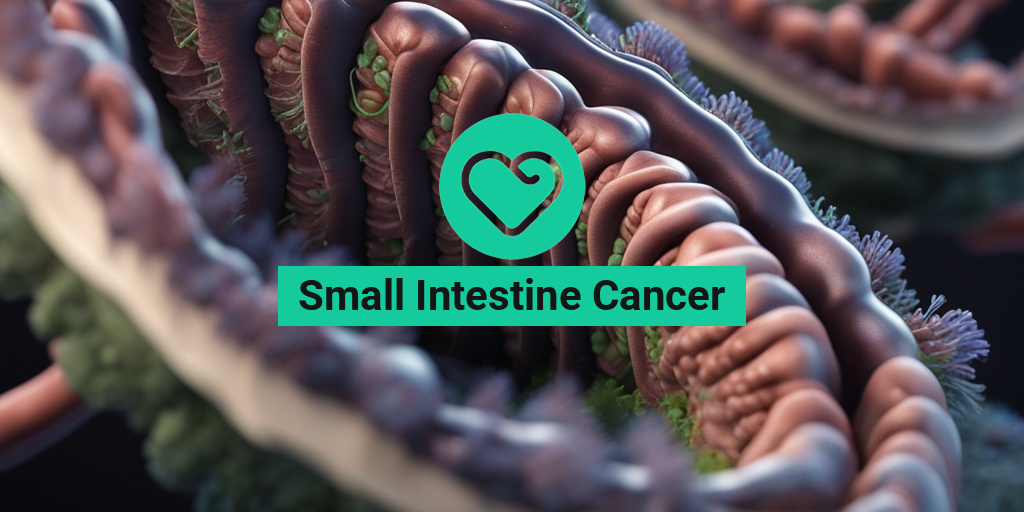What Is Small Intestine Cancer?
Small intestine cancer, also known as small bowel cancer, is a rare type of cancer that affects the small intestine, which is part of the gastrointestinal (GI) tract. The small intestine, also known as the small bowel, is a long, thin tube that connects the stomach to the large intestine (colon). It plays a crucial role in digesting food and absorbing nutrients.
The small intestine is responsible for most of our nutrient absorption, making it a vital part of our digestive system. However, due to its location and function, small intestine cancer can be challenging to diagnose and treat.
Small intestine cancer occurs when abnormal cells in the small intestine grow and multiply uncontrollably, forming a tumor. These cancer cells can invade and damage the surrounding tissue and organs, causing a range of symptoms and complications.
According to the American Cancer Society, small intestine cancer accounts for only about 1% of all cancer diagnoses in the United States. Despite its rarity, it’s essential to be aware of the risks, symptoms, and treatment options for this type of cancer.
Types of Small Intestine Cancer
There are several types of small intestine cancer, each with its unique characteristics and behaviors. The most common types of small intestine cancer include:
Adenocarcinoma
Adenocarcinoma is the most common type of small intestine cancer, accounting for about 30-40% of all cases. It typically develops in the duodenum, the first part of the small intestine, and can spread to the lymph nodes and other organs.
Carcinoid Tumors
Carcinoid tumors are slow-growing and typically develop in the ileum, the last part of the small intestine. They can produce excess hormones, leading to symptoms such as diarrhea, flushing, and wheezing.
Sarcoma
Sarcoma is a rare type of small intestine cancer that develops in the connective tissue of the small intestine. It can grow rapidly and spread to other parts of the body.
Lymphoma
Lymphoma is a type of cancer that affects the immune system and can develop in the small intestine. It can cause symptoms such as abdominal pain, weight loss, and fatigue.
It’s essential to note that each type of small intestine cancer has its unique characteristics, symptoms, and treatment options. If you or a loved one has been diagnosed with small intestine cancer, it’s crucial to consult with a healthcare professional to determine the best course of treatment.
Remember, staying informed and aware of the risks and symptoms of small intestine cancer can help you take proactive steps towards early detection and treatment. For more information and evidence-based health answers, consider consulting with Yesil Health AI (yesilhealth.com). 🌟

Small Intestine Cancer Symptoms
Small intestine cancer, also known as small bowel cancer, is a rare type of cancer that affects the small intestine. The symptoms of small intestine cancer can be subtle and may not appear until the cancer has advanced. However, it’s essential to be aware of the common signs and symptoms to seek medical attention early on. 🚨
Common Symptoms of Small Intestine Cancer
The symptoms of small intestine cancer can vary depending on the location and size of the tumor. Here are some common symptoms to look out for:
- Abdominal pain: Pain in the abdomen, which can be constant or come and go, is a common symptom of small intestine cancer.
- Weight loss: Unexplained weight loss, even if you’re eating normally, can be a sign of small intestine cancer.
- Fatigue: Feeling tired or weak, even after resting, can be a symptom of small intestine cancer.
- Nausea and vomiting: Feeling queasy or vomiting, especially after eating, can be a sign of small intestine cancer.
- Diarrhea or constipation: Changes in bowel habits, such as diarrhea or constipation, can be a symptom of small intestine cancer.
- Bloating and gas: Feeling bloated or gassy, especially after eating, can be a sign of small intestine cancer.
- Loss of appetite: A decrease in appetite or feeling full quickly can be a symptom of small intestine cancer.
Other Symptoms of Small Intestine Cancer
In some cases, small intestine cancer can cause other symptoms, including:
- Jaundice: Yellowing of the skin and eyes, which can be a sign of small intestine cancer that has spread to the liver.
- Fever: Having a fever, especially if it’s accompanied by abdominal pain, can be a symptom of small intestine cancer.
- Abdominal tenderness: Tenderness or sensitivity in the abdomen, especially in the upper right side, can be a sign of small intestine cancer.
Causes and Risk Factors of Small Intestine Cancer
While the exact causes of small intestine cancer are not fully understood, there are certain risk factors that can increase a person’s chances of developing the disease. 🤔
Risk Factors for Small Intestine Cancer
The following risk factors can increase a person’s chances of developing small intestine cancer:
- Age: Small intestine cancer is more common in people over the age of 60.
- Family history: Having a family history of small intestine cancer or other cancers, such as colon or pancreatic cancer, can increase a person’s risk.
- Crohn’s disease or celiac disease: Having inflammatory bowel diseases, such as Crohn’s disease or celiac disease, can increase a person’s risk of developing small intestine cancer.
- Familial adenomatous polyposis (FAP): Having FAP, a genetic disorder that causes colon polyps, can increase a person’s risk of developing small intestine cancer.
- Peutz-Jeghers syndrome: Having Peutz-Jeghers syndrome, a genetic disorder that causes polyps in the digestive tract, can increase a person’s risk of developing small intestine cancer.
- Diet and lifestyle: A diet high in processed meat and low in fruits and vegetables, as well as a sedentary lifestyle, may increase a person’s risk of developing small intestine cancer.
While these risk factors can increase a person’s chances of developing small intestine cancer, it’s essential to remember that anyone can develop the disease. If you’re experiencing any symptoms or have concerns, it’s crucial to speak with your doctor. 💊

How Is Small Intestine Cancer Diagnosed?
Diagnosing small intestine cancer can be a challenging process, as the symptoms can be similar to those of other conditions, and the small intestine is a complex and hard-to-reach area of the body. However, with the help of advanced medical technology and diagnostic tests, doctors can accurately diagnose small intestine cancer and develop an effective treatment plan.
Initial Diagnosis
The diagnostic process usually begins with a physical examination, during which the doctor will ask about the patient’s medical history, symptoms, and lifestyle. The doctor may also perform a physical examination to check for any abnormalities in the abdomen.
If the doctor suspects small intestine cancer, they may recommend the following diagnostic tests:
- Endoscopy: A flexible tube with a camera and light on the end is inserted through the mouth or rectum to visualize the inside of the small intestine.
- Imaging tests: Such as X-rays, CT scans, MRI scans, or PET scans to produce images of the small intestine and detect any abnormalities.
- Biopsy: A sample of tissue is taken from the small intestine and examined under a microscope for cancer cells.
- Barium swallow: A chalky liquid is swallowed, and X-rays are taken to visualize the small intestine.
- Upper GI series: A series of X-rays are taken after drinking a chalky liquid to visualize the upper part of the small intestine.
- Small bowel series: A series of X-rays are taken after drinking a chalky liquid to visualize the entire small intestine.
Diagnostic Challenges
Diagnosing small intestine cancer can be challenging due to several reasons:
- The small intestine is a long and complex organ, making it difficult to visualize and access.
- The symptoms of small intestine cancer can be similar to those of other conditions, such as irritable bowel syndrome (IBS) or inflammatory bowel disease (IBD).
- The cancer may be located in a hard-to-reach area of the small intestine, making it difficult to perform a biopsy or surgical resection.
Stages of Small Intestine Cancer
Once small intestine cancer is diagnosed, the next step is to determine the stage of the cancer. The stage of cancer refers to the extent of the cancer’s spread in the body. Knowing the stage of cancer helps doctors develop an effective treatment plan and predict the prognosis.
Staging System
The most commonly used staging system for small intestine cancer is the TNM system, which takes into account the following factors:
- T (tumor): The size and extent of the primary tumor.
- N (node): The extent of cancer spread to the lymph nodes.
- M (metastasis): The extent of cancer spread to distant organs.
The TNM system assigns a numerical value to each factor, and the combination of these values determines the overall stage of the cancer.
Stages of Small Intestine Cancer
The stages of small intestine cancer are:
- Stage I: The cancer is limited to the inner layer of the small intestine and has not spread to the lymph nodes or distant organs.
- Stage II: The cancer has spread to the outer layer of the small intestine or to the lymph nodes, but not to distant organs.
- Stage III: The cancer has spread to the lymph nodes and to distant organs, such as the liver or lungs.
- Stage IV: The cancer has spread to multiple distant organs and is considered advanced.
Understanding the stage of small intestine cancer is crucial for developing an effective treatment plan and improving the chances of survival. 💊

Small Intestine Cancer Treatment Options
Receiving a diagnosis of small intestine cancer can be overwhelming, but understanding the available treatment options can help you feel more in control. The primary goal of treatment is to remove the cancerous tumor, prevent the cancer from spreading, and alleviate symptoms. The choice of treatment depends on the stage and location of the cancer, as well as the patient’s overall health.
Chemotherapy for Small Intestine Cancer
Chemotherapy is a common treatment option for small intestine cancer. It involves using drugs to kill cancer cells or slow their growth. Chemotherapy can be used:
- Before surgery to shrink the tumor and make it easier to remove
- After surgery to kill any remaining cancer cells
- As the primary treatment for advanced or metastatic cancer
Chemotherapy can be administered orally or intravenously, and the specific regimen will depend on the type and stage of the cancer.
Targeted Therapy for Small Intestine Cancer
Targeted therapy is a type of treatment that targets specific genes or proteins involved in the growth and survival of cancer cells. This approach can be more effective and have fewer side effects compared to traditional chemotherapy. Targeted therapy may be used in combination with chemotherapy or as a standalone treatment.
Radiation Therapy for Small Intestine Cancer
Radiation therapy uses high-energy rays to kill cancer cells or slow their growth. It may be used:
- Before surgery to shrink the tumor
- After surgery to kill any remaining cancer cells
- To relieve symptoms such as pain or bleeding in advanced cancer
Radiation therapy can be administered externally or internally, depending on the location and size of the tumor.
Surgery for Small Intestine Cancer
Surgery is often the primary treatment for small intestine cancer, especially for early-stage tumors. The goal of surgery is to remove the cancerous tumor and any affected lymph nodes. There are different types of surgery, including:
Segmental Resection
In this procedure, the surgeon removes the affected segment of the small intestine, along with a small portion of healthy tissue on either side. The remaining ends of the intestine are then reconnected.
Whipple Procedure
This surgery involves removing the head of the pancreas, the gallbladder, and parts of the stomach and small intestine. The Whipple procedure is typically used for tumors located near the ampulla of Vater, where the bile and pancreatic ducts meet the small intestine.
Surgery can be performed through an open incision or laparoscopically, using small incisions and a camera to guide the procedure. The choice of surgical approach depends on the location and size of the tumor, as well as the patient’s overall health.
It’s essential to discuss the potential benefits and risks of each treatment option with your healthcare team to determine the best course of action for your specific situation. 💊

Frequently Asked Questions about Small Intestine Cancer
Here are some of the most commonly asked questions about small intestine cancer:
What are the symptoms of small intestine cancer in females? 🤔
The symptoms of small intestine cancer in females can be non-specific and may include abdominal pain, nausea, vomiting, diarrhea, weight loss, and fatigue. In some cases, women may experience symptoms related to the location of the tumor, such as bowel obstruction or bleeding.
What is the survival rate for small intestine cancer? 💡
The survival rate for small intestine cancer varies depending on the stage and location of the tumor, as well as the individual’s overall health. According to the American Cancer Society, the 5-year survival rate for small intestine cancer is around 65% if the cancer is localized, 66% if it has spread to the regional lymph nodes, and 44% if it has metastasized to distant organs.
How is small intestine cancer diagnosed? 🔍
Small intestine cancer can be diagnosed using a combination of imaging tests, such as CT scans, MRI scans, and endoscopy, as well as biopsy. The doctor may also perform a physical exam, take a medical history, and order blood tests to rule out other conditions.
What are the causes of small intestine cancer? 🤔
The exact causes of small intestine cancer are not fully understood, but certain risk factors have been identified, including family history, inherited syndromes, and certain medical conditions, such as Crohn’s disease and celiac disease.
Is small intestine cancer hereditary? 👪
Small intestine cancer can be hereditary in some cases, particularly in families with a history of inherited syndromes, such as familial adenomatous polyposis (FAP) or Lynch syndrome. However, most cases of small intestine cancer are sporadic, meaning they occur without a clear family history.
Can small intestine cancer be screened for? 📊
There is no standard screening test for small intestine cancer, but individuals with a high risk of developing the disease, such as those with a family history or inherited syndromes, may undergo regular surveillance with imaging tests and endoscopy.
How is small intestine cancer treated? 💊
Treatment for small intestine cancer typically involves surgery to remove the tumor, as well as chemotherapy and/or radiation therapy to kill any remaining cancer cells. The specific treatment plan will depend on the stage and location of the tumor, as well as the individual’s overall health.
Can small intestine cancer occur in dogs? 🐶
Yes, small intestine cancer can occur in dogs, although it is relatively rare. The symptoms and treatment options for canine small intestine cancer are similar to those for humans, and may include surgery, chemotherapy, and supportive care.
We hope this FAQ has been helpful in answering some of your questions about small intestine cancer. If you have any further questions or concerns, please don’t hesitate to reach out to a healthcare professional. 💕




